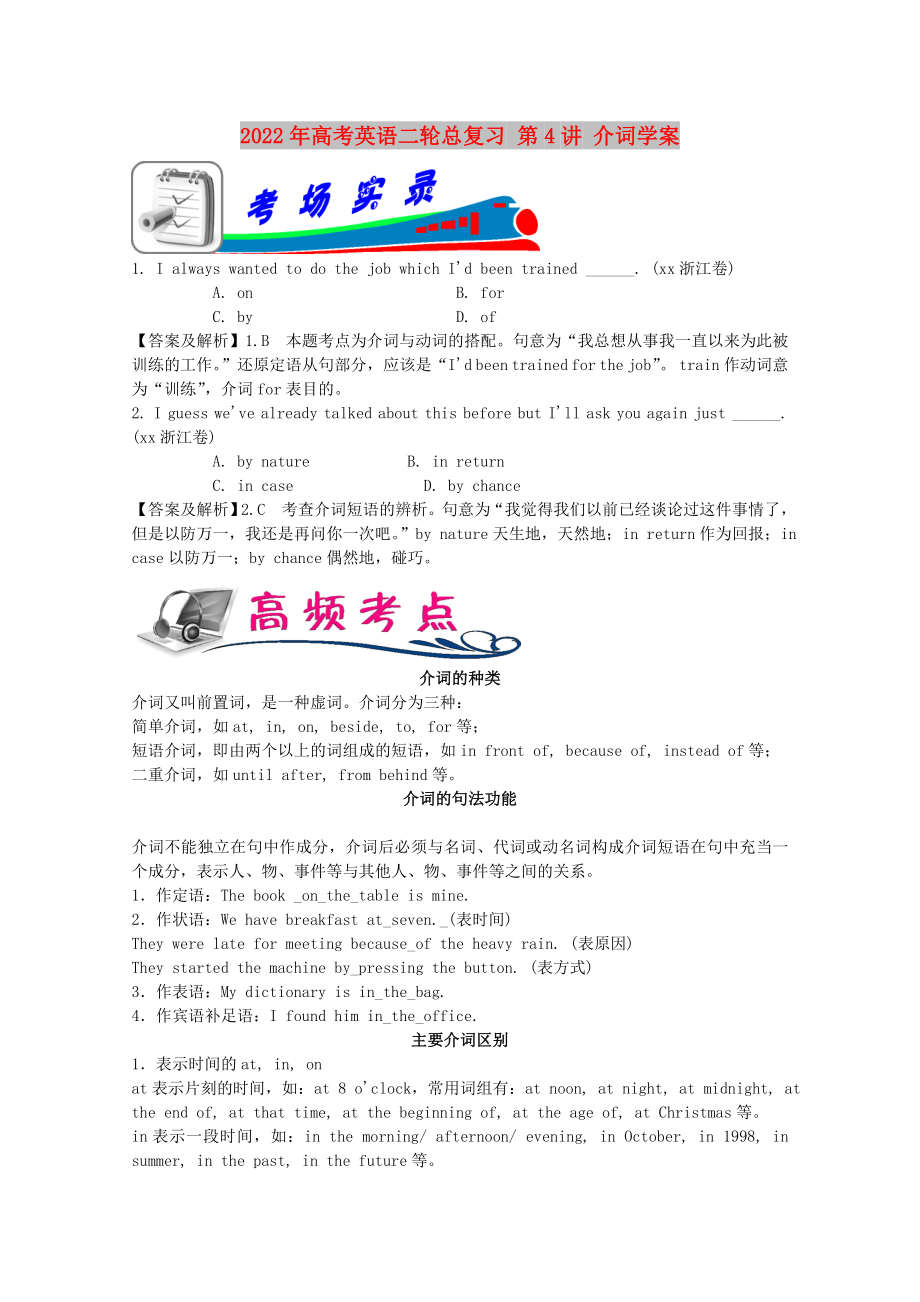《2022年高考英語(yǔ)二輪總復(fù)習(xí) 第4講 介詞學(xué)案》由會(huì)員分享���,可在線閱讀���,更多相關(guān)《2022年高考英語(yǔ)二輪總復(fù)習(xí) 第4講 介詞學(xué)案(3頁(yè)珍藏版)》請(qǐng)?jiān)谘b配圖網(wǎng)上搜索。
1���、2022年高考英語(yǔ)二輪總復(fù)習(xí) 第4講 介詞學(xué)案
1. I always wanted to do the job which I'd been trained ______. (xx浙江卷)
A. on B. for
C. by D. of
【答案及解析】1. B 本題考點(diǎn)為介詞與動(dòng)詞的搭配���。句意為“我總想從事我一直以來(lái)為此被訓(xùn)練的工作?��!边€原定語(yǔ)從句部分���,應(yīng)該是“I'd been trained for the job”。 train作動(dòng)詞意為“
2���、訓(xùn)練”���,介詞for表目的。
2. I guess we've already talked about this before but I'll ask you again just ______. (xx浙江卷)
A. by nature B. in return
C. in case D. by chance
【答案及解析】2. C 考查介詞短語(yǔ)的辨析���。句意為“我覺(jué)得我們以前已經(jīng)談?wù)撨^(guò)這件事情了���,但是以防萬(wàn)一,我還是再問(wèn)你一次吧���?��!眀y nature天生地,天然地���;in return作為回報(bào)
3���、;in case以防萬(wàn)一���;by chance偶然地���,碰巧���。
介詞的種類
介詞又叫前置詞,是一種虛詞���。介詞分為三種:
簡(jiǎn)單介詞���,如at, in, on, beside, to, for等;
短語(yǔ)介詞���,即由兩個(gè)以上的詞組成的短語(yǔ)���,如in front of, because of, instead of等;
二重介詞���,如until after, from behind等���。
介詞的句法功能
介詞不能獨(dú)立在句中作成分,介詞后必須與名詞���、代詞或動(dòng)名詞構(gòu)成介詞短語(yǔ)在句中充當(dāng)一個(gè)成分���,表示人���、物���、事件等與其他人���、物、事件等之間的關(guān)系���。
1.作定語(yǔ):The book _on_the_
4���、table is mine.
2.作狀語(yǔ):We have breakfast at_seven._(表時(shí)間)
They were late for meeting because_of the heavy rain. (表原因)
They started the machine by_pressing the button. (表方式)
3.作表語(yǔ):My dictionary is in_the_bag.
4.作賓語(yǔ)補(bǔ)足語(yǔ):I found him in_the_office.
主要介詞區(qū)別
1.表示時(shí)間的at, in, on
at表示片刻的時(shí)間,如:at 8 o'clo
5���、ck���,常用詞組有:at noon, at night, at midnight, at the end of, at that time, at the beginning of, at the age of, at Christmas等。
in表示一段時(shí)間���,如:in the morning/ afternoon/ evening, in October, in 1998, in summer, in the past, in the future等���。
on總是跟日子有關(guān)���,如: on Monday, on Christmas morning, on May Day, on a warm m
6、orning等���。
2.表示時(shí)間的since和from
since表示從過(guò)去到現(xiàn)在的一段時(shí)間的過(guò)程���,常與現(xiàn)在完成時(shí)連用。from表示從時(shí)間的某一點(diǎn)開(kāi)始���,一般多與現(xiàn)在時(shí)���、過(guò)去時(shí)、將來(lái)時(shí)連用���。如:
I hope to do morning exercises from_today.
We have not seen each other since_1995.
3. between和 among
一般說(shuō)來(lái)���,between表示兩者之間,among用于三者或三者以上的中間���。如:
You are to sit between your father and me.
He is alw
7���、ays happy among his classmate
4.表示“用”的in, by和with
with用于有形的工具���,或身體某些器官等的方面,其后的名詞多被冠詞或物主代詞等修飾���。而in常用于表示材料、方式���、方法���、度量、單位���、語(yǔ)言���、聲音等。by后接名詞且名詞前常沒(méi)有修飾詞���,名詞用原形���。如:
He is writing a letter with_a_pen.
He wrote the letter in_pencil._
We measured it in_pounds. (按磅計(jì)算)
Tell me the story in_English.
by hand靠手工 b
8���、y ship乘船 by air乘飛機(jī)
5.a(chǎn)s和 like
as作“作為”、“以……地位或身份”解���。如:Let me speak to you as a father. (事實(shí)是父親)
like作“像……一樣”解���。如:Let me speak to you like a father. (事實(shí)上不是父親)。
6.in front of 和in the front of
in front of = before���,是“在……前面”的意思(不在某物內(nèi))���;in the front of則是“在……前部”的意思(在某物內(nèi))。如:There is a desk in front of the b
9���、lackboard.
The boy sat in the front of the car.
易錯(cuò)易混點(diǎn)
1. 表示時(shí)間的in和after
兩者都表示“在(某個(gè)時(shí)間)之后”���,區(qū)別在于in表示“在(一段時(shí)間)之后”,而after則表示“在(某一具體時(shí)間點(diǎn))之后”���,in短語(yǔ)和將來(lái)時(shí)態(tài)連用���,after短語(yǔ)和過(guò)去時(shí)態(tài)或?qū)?lái)時(shí)態(tài)連用���。如:
We'll be back in three days.
After seven the rain began to fall.
注意:aft
10、er有時(shí)也可以表示在一段時(shí)間之后(常用在過(guò)去時(shí)里)���。如:
After two months he returned.
2. 表示地理位置的in, on, to
in表示在某范圍內(nèi)���,on指與什么毗鄰,to指在某環(huán)境范圍之外���。如:
Changchun is in the northeast of China.
Mongolia is on_the north of China.
Japan is to the east of China.
3. 表示“穿過(guò)……”的through和across
11、
through表示從內(nèi)部通過(guò)���;across則表示從一端至另一端在表面上的通過(guò)���。如:
Water flows through the pipe.
The old man walked across the street.
4. besides, except, but, except for
besides指“除了……還有,再加上”���。如:All went out besides me.
except指“除了���,減去什么”。如:All went out except me.
but與except
12、意思近似���,表示“除了……外”���,經(jīng)常用在no, all, nobody, anywhere, everything等和其他疑問(wèn)詞后面。如:
I never saw him reading anything_but the newspaper.
except for表示“除……以外”���,跟except的區(qū)別在于其后跟的詞與前面所提到的不是同一類別���。如:
His diary is good except_for a few spelling mistakes.
5. for與of用于不定式復(fù)合結(jié)構(gòu)
(1) It is+adj. +of sb. to do sth
13、. = sb. +be+adj. +to do sth.
當(dāng)形容詞說(shuō)明不定式邏輯主語(yǔ)的性質(zhì)���、特征時(shí)���,用of。常見(jiàn)的此類形容詞有:kind, good, nice, clever, stupid, foolish, considerate, polite, impolite, cruel等���。
(2) It is+adj. +for sb. to do sth.
當(dāng)形容詞說(shuō)明不定式的性質(zhì)時(shí)用for���。常見(jiàn)的此類形容詞有:possible, impossible, important, necessary等。如:
It is quite important for us to protect our environment.
 2022年高考英語(yǔ)二輪總復(fù)習(xí) 第4講 介詞學(xué)案
2022年高考英語(yǔ)二輪總復(fù)習(xí) 第4講 介詞學(xué)案

